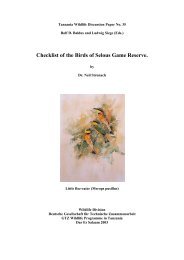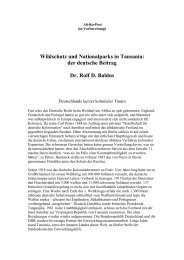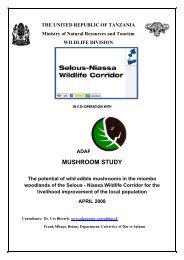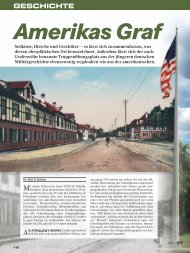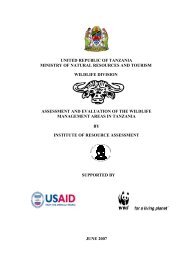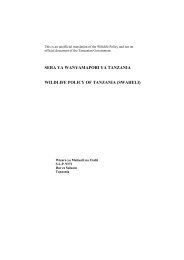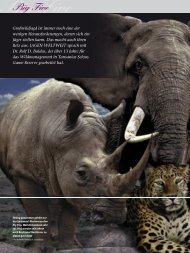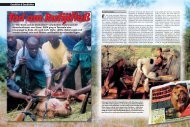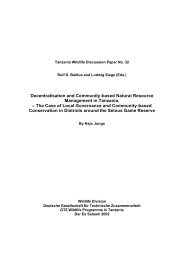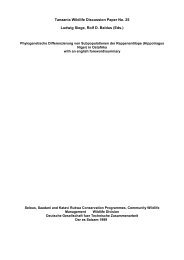African Indaba Articles - wildlife-baldus.com
African Indaba Articles - wildlife-baldus.com
African Indaba Articles - wildlife-baldus.com
You also want an ePaper? Increase the reach of your titles
YUMPU automatically turns print PDFs into web optimized ePapers that Google loves.
The authorsDr. Graham Child was the Director of the Department of National Parks and Wildlife Management inZimbabwe from 1971 to1986 . He has been an independent <strong>wildlife</strong> consultant since retirement and has awide experience international experience in all aspects of <strong>wildlife</strong> and protected area managementDr. Rolf D. Baldus has worked for 13 years in <strong>wildlife</strong> management, CBNRM and the rehabilitation ofdegraded protected areas in Eastern Africa. In Zimbabwe he was responsible for planning a donor funded<strong>wildlife</strong> project in the early nineties (www.<strong>wildlife</strong>-<strong>baldus</strong>.<strong>com</strong>)“People and Wildlife” e.V. is a registered NGO and charity in Germany. Its objective is to foster <strong>com</strong>munitybased <strong>wildlife</strong> conservation in Africa.DisclaimerThe paper reflects the personal opinion of the authors only and not necessarily the views of institutions theywork for. We thank a number of persons who have received and <strong>com</strong>mented on earlier drafts, withoutbearing any responsibility for the content.Kenya: The Example Not to FollowBy Ian ParkerFor multiple reasons, over the past 110 years or so, Kenya has had more influence on internationalconservation policy than any other <strong>African</strong> country. Among them are openness of terrain, visibility ofabundant animals, temperate climate, the British aristocracy, Hollywood and Hemingway. At least until 1910the sale of ivory and in<strong>com</strong>e from sport hunters accounted for more than half the country's in<strong>com</strong>e andKenya was probably the world's first country where sustained <strong>wildlife</strong>-based tourism played a reallysignificant part in its economy.Recreational hunting was the principal form of tourism from 1890 until the early 1960s, after which“motorized game viewing x package tourism” displaced it. In the 1970s the Kenya Game Department and itssuccessor - the Wildlife Conservation & Management Department (WCMD) - became so corrupted that in1977 all hunting was banned. Few realize that the cause of the ban was not recreational hunting, but huntingin all its forms, including problem animal control and <strong>com</strong>mercial cropping through which the Department rana massive trade. Be that as it may, the industry that set up Africa's <strong>wildlife</strong> based tourism and had beensustained for over seven decades was closed down. From that point on, Kenya became an example of whatnot to do.While the primary reasons for stopping hunting were administrative and political, they were understandablywel<strong>com</strong>ed by the anti-hunting fraternity. Kenya was the world's first country to totally ban hunting (except forgame birds) and as such is the jewel in the anti-use crown. The hunting ban was initially intended to betemporary - a point Government repeatedly stated and of which evidence exists in both files and mediaarchives. The anti-hunting parties made the translation of temporary to permanent a major priority.The solution to corruption in WCMD was to have sacked all who were corrupt. Stopping hunting wentnowhere near the root of the problem. Corruption fostered in<strong>com</strong>petence and inefficiency which, in turn,ensured WCMD (1975 to 1989) and its successor, the Kenya Wildlife Service (KWS, 1989 to present) wouldbe perennially bankrupt and 'influenceable' by anyone prepared to spend money on it. And this is what theanimal rightists have done. It suited them to have a corrupt, centralized and autocratic body responsible for<strong>wildlife</strong> because it was simple to control.With its dependence on 'help', KWS seems to think it must dance to tunes played by the animal rightspipers. This has effectively blocked investment in sustainable use of wild animals - other than for viewingover which KWS can exercise no control. Such sustainable use as was briefly allowed, understandably,involved little investment. No one wanted to put money into developing a resource whose use was controlledby KWS. More seriously, reluctance to countenance hunting has aggravated human/wild animal conflict thatcosts the country a huge amount annually. Many Members of Parliament from <strong>wildlife</strong> districts doubt the83



